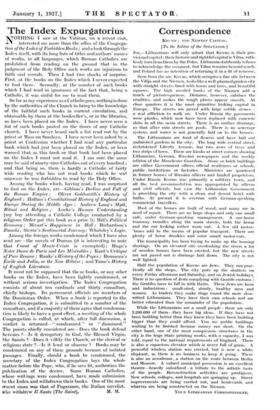The Index Expurgatorius
TOTIIING I saw at the Vatican, on a recent visit, -LI • interested me more than the office of the Congrega- tion of the Index of Forbidden Books; and a look through the Index itself, with its long lists of titles and authors' names of works, in all languages, which Roman Catholics are prohibited from reading on the ground that in the -judgment of the Holy Office such works are injurious to faith and morals. Then I had two shocks of surprise. First, at the books on the Index which I never expected to find there.. Secondly, at the number of such books which I had read in ignorance of the fact that, being a Catholic, it was sinful for me to read them.
- So far as my experience as a Catholic goes, nothing is done by the authorities of the Church to bring to the knowledge of the faithful such books in current circulation, and obtainable by them at the bookseller's, or in the libraries, as have been placed on the Index. I have never seen a list of such books posted on the doors of any Catholic church. I have never heard such a list read out by the priest at Mass on Sundays. I have never been asked by a priest at Confession whether I had read any particular book which had just been placed on the Index, or been warned that as this book or that book had been placed on the Index I must not read it. I am sure the same may be said of ninety-nine Catholics out of every hundred ; and that being so, there is hardly a Catholic of fairly wide reading who has not read books which he was unaware he was forbidden to read by the Holy Office.
Among the books which, having read, I was surprised to find on the Index, are—Gibbon's Decline and Fall of the Roman Empire ; Oliver Goldsmith's History of England ; Hallam's Constitutional History of England and Europe During the Middle Ages ; Andrew Lang's Myth, Ritual and Religion ; Locke's Human Understanding (my boy attending a Catholic College conducted by a religious Order got this book as a prize !); Mill's Political Economy ; Mivart's Happiness in Hell ; Richardson's Pamela; Sterne's Sentimental Journey; Whateley's Logic.
Among the foreign works condemned which I have also read are—the novels of Dumas (it is interesting to note that Count of Monte-Cristo is exempted) ; Hugo's Notre Dame de Paris and Les Miserables ; Kant's Critique of Pure Reason ; Ranke's History of the Popes ; Rousseau's Emile and Julia; or the New Heloise ; and Taine's History of English Literature.
It must not be supposed that the se books, or any other books on the Index, have been lightly condemned, or without serious investigation. The Index Congregation consists of about ten cardinals and thirty consultors, chiefly bishops. Its permanent officials are members of the Dominican Order. When a book is reported to the Index Congregation, it is submitted to a number of the consultors, and if a majority of them agree that condemna- tion is likely to have a good effect, a meeting of the whole Congregation is called, at which, after full discussion, a verdict is returned—" condemned " or " dismissed.'' The points chiefly considered are—Does the book defend heresies ?—Is it derogatory to God, the Blessed Virgin, the Saints ?—Does it vilify the Church, or the clerical or religious state ?—Is it lewd or obscene ? Books may be condemned on any of these grounds because of isolated passages. Finally, should a book be condemned, the secretary of the Index Congregation lays the whole matter before the Pope, who, if he sees fit, authorizes the publication of the decree. Some Roman Catholics, whose writings were condemned, have made submission to the Index and withdrawn their books. One of the most recent cases was that of Fogazzaro, the Italian novelist, who withdreiv Il Santo (The Saint). M. M.


































 Previous page
Previous page